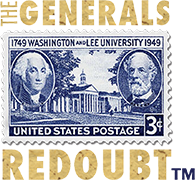To the PC Police: Leave America’s Pets Alone
Now they’re coming after Lee’s horse.
Statue of Gen. Robert E. Lee astride his horse, Traveller, in Gettysburg (MGS/Shutterstock)

Americans have a longstanding love affair with their pets. Polls by Gallup and Pew Research consistently show that a majority of Americans have pets and consider the pets family members.
Not surprisingly, pets have figured prominently throughout American history. Almost every president’s pets have been well-known residents of the White House, and Calvin Coolidge was perhaps the most avid collector of them. He and his wife, Grace, harbored a host of pets, some of which were quite exotic. Rebecca, the raccoon, led the list. There were some political overtones as well. Lion cubs from the Johannesburg Zoo were dubbed “Tax Reduction” and “Budget Bureau” by Coolidge, indicating a sense of genuine endearment. (READ MORE: From Sitting Room to White House: 100 Years of Calvin Coolidge)
Generally, pets have been one of the very few areas off limits to political attack. President Harry Truman famously advised, “If you want a friend in Washington, get a dog.” Only rarely have partisan attacks been vented toward pets, and, in those cases, the public outrage has been immediate and dispositive.
Toward the end of World War II in 1944, President Franklin Roosevelt was criticized by Republicans for dispatching a naval destroyer back to the Aleutian Islands to retrieve his beloved Scottish terrier, Fala. Ever a master of political spin, FDR turned the tables on his critics in a Sept. 23, 1944, address to the Teamsters Union. With mock indignation, the president allowed that, although he and his family had suffered “malicious falsehoods” over many years, he claimed the right to “object to libelous statements about my dog.” He went on to charge these despicable Republicans with stooping to attack a defenseless dog in order to distract Americans from important issues facing the country. The public immediately rallied to Fala’s defense, and the partisan attacks moved on to other issues.
An equally famous political pet episode occurred in 1952. After being nominated as Dwight Eisenhower’s running mate at the Republican convention, Richard Nixon found himself under heavy partisan attack. A New York Post article entitled “Secret Rich Men’s Trust Fund Keeps Nixon in Style” ominously alleged that campaign donors were buying influence with Nixon by funding a personal slush fund. Outrage followed, and Ike was under pressure to dump Nixon from the ticket. (READ MORE: God and Man at W&L)
The Republicans decided to let Nixon defend himself. If his defense failed, he would be dumped. On Sept. 23, Nixon appeared on television and made his case. He gave a detailed accounting of the fund, defended its legality, and challenged his opponent Adlai Stevenson to provide similar data. In closing, Nixon made one admission. With feigned penitence, he revealed that there was just one campaign donation that was personal. A Texas voter had heard Nixon’s wife Pat mention that their two daughters really wanted a pet dog. So he sent them a Cocker spaniel that Nixon’s daughter Tricia named Checkers. Looking directly into the cameras, Nixon said that his daughters loved Checkers, and they were keeping him. The speech was a triumph. The public inundated the Republican National Committee with demands that Nixon remain on the ticket. Ike responded by summoning Nixon and greeting him with, “Dick, you’re my boy.”
First Lee, and Now His Horse
The well-established public aversion to attacking defenseless pets now appears defunct. In this age of humorless political correctness, even a famous pet is no longer off limits from calumny. At Washington and Lee University in Lexington, Virginia, the administration mounted a protracted campaign — which has failed for now — to eradicate the historical significance of its namesake, Gen. Robert E. Lee, in the name of political correctness and anti-racism. Lee’s name has been stripped from the chapel; his portrait has been removed (along with that of George Washington, the other namesake); Founders’ Day is no longer observed; Lee’s image (and Washington’s) is no longer on diplomas; and a plaque commemorating the spot where Lee was sworn in as university president has disappeared. All these actions have sparked considerable outrage from many alumni, who honor both Lee’s contributions to the school and his character as a leader. (RELATED: Robert E. Lee, the Man for These Hard Times)
But the latest chapter in this onslaught has crossed a previously sacrosanct line. During this year’s quiet summer recess, two time-honored plaques commemorating Lee’s faithful horse Traveller have been removed. Apparently, Traveller’s Confederate connections were just too much for the administration, and any commemoration of his dutiful service to Lee demanded Orwellian removal. One W&L student wrote wistfully, “Traveller was a beloved part of the campus story.”
But where’s the traditional American outrage? In the spirit of Fala and Checkers, Traveller should be off limits to the relentless political correctness squad that seeks to rewrite history.
Garland S. Tucker III, retired chairman/CEO Triangle Capital Corporation, author of Conservative Heroes: Fourteen Leaders Who Shaped America — Jefferson to Reagan (ISI Books) and The High Tide of American Conservatism: Davis, Coolidge and the 1924 Election (Emerald Books).
